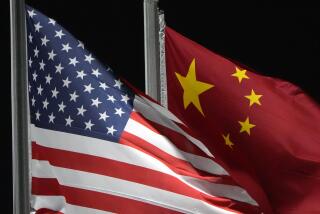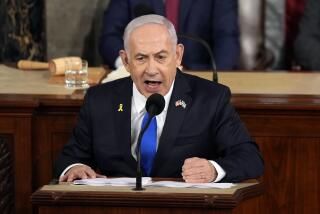China-Syria Missile Deal Concluded, Officials Say
- Share via
HONG KONG — China already has concluded a deal to sell new M-9 short-range missiles to Syria, according to Western officials who keep track of Chinese arms sales.
In recent weeks, some alarmed U.S. officials have voiced the fear that the delivery of such missiles by Beijing to Damascus could eventually lead to a preventive Israeli air strike, or even to a war in the Middle East.
Although in public, U.S. officials have described the missile sale as still in the negotiating stage, Western experts on Chinese arms sales said that in reality the deal has already been completed.
The newly developed missiles are not yet ready for delivery, but China has agreed to supply them to Syria “over the next 18 months,” one source said. However, he would not say exactly how many missiles Syria bought or how much money it has agreed to pay China for them.
A U.S. official, who was interviewed on the condition that he not be identified, confirmed that the U.S. government is aware that a specific Chinese-Syrian missile deal has been concluded. He said the United States has not made this information public because U.S. officials do not wish to disclose the extent of their knowledge about Chinese arms transactions.
Secretary of State George P. Shultz is expected to make U.S. concern about China’s arms sales in the Middle East one of the principal items on his agenda when he travels to Beijing today for two days of meetings with senior Chinese leaders. Shultz stopped for a day in Hong Kong on Wednesday.
In a briefing for reporters traveling with Shultz, a senior U.S. official said Wednesday that the United States has received reports that China is trying to sell short-range missiles to Syria, Pakistan, Iran and Libya. But he added that none of these reports has been confirmed.
He emphasized that “there are no deliveries taking place, and it doesn’t appear at this time the missile is ready for delivery. . . . You have to draw a distinction between a sale and a delivery.”
The Western officials monitoring Chinese arms sales said China has also sold the M-9 missiles to several other countries, but the officials would not identify these. Last month China denied news reports that it was negotiating to sell missiles to Syria.
Could Strike Israel
The M-9 is an advanced surface-to-surface ballistic missile with a range of 175 to 375 miles. If acquired by Syria, the missiles could be used to strike at targets in Israel.
“The problem with ballistic missiles is that there is no defense against them, and they are non-recallable,” the senior U.S. official said at the briefing Wednesday.
When U.S. intelligence agencies learned earlier this year of another Chinese arms deal in the Middle East--the sale of intermediate-range CSS-2 missiles to Saudi Arabia--U.S. officials expressed concern that Israel might strike against the launching sites. Similar fears are being raised in connection with the Syrian transaction.
“What China is doing could lead to a war,” one U.S. official said. Another U.S. official disagreed with this assessment but said the introduction of the missiles into the Middle East could create problems of crisis management. One possible crisis, he said, would be an attempted air strike against the missiles.
Shultz and other U.S. officials have become increasingly critical of China for its arms sales policies. In Bangkok last week at a meeting of the Assn. of Southeast Asian Nations, Shultz took the extraordinary step of publicly complaining about Beijing’s arms sales.
Notes Irony in Sale
Asked at a news conference about proposals for a nuclear-free zone in the Pacific, Shultz explained the official U.S. policy on the importance of nuclear deterrents. He then noted what he called the irony that just when the United States and the Soviet Union have signed a treaty eliminating a class of intermediate-range nuclear missiles, the Chinese have begun to sell such missiles.
Most U.S. officials describe the Chinese motivation for the arms sale as financial--that is, as a way of getting foreign exchange for the nation’s modernization program. In this view, the arms sales are to some extent a replacement for China’s offshore oil program, which has failed to produce the earnings Beijing had expected.
But some U.S. officials acknowledge that the arms sales have important foreign policy implications, giving China an increasingly important role in the Middle East.
“China has not been a major player in the Middle East,” said the U.S. official who briefed reporters Wednesday. “Its emergence as a major arms supplier in the area has changed that.”
More to Read
Sign up for Essential California
The most important California stories and recommendations in your inbox every morning.
You may occasionally receive promotional content from the Los Angeles Times.












